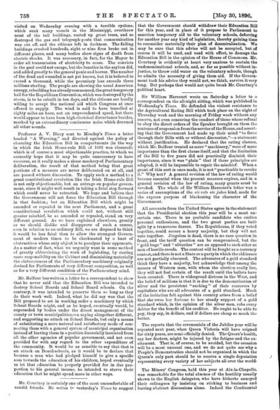Sir William Harcourt wrote on Saturday a letter to at
correspondent on the all-night sitting, which was published in Wednesday's Times. He defended the violent resistance to. the Agricultural Rating Bill which took place on the night of Thursday week and the morning of Friday week without any reserve, not even censuring the conduct of those whose refusal to obey the direct orders of the Speaker brought on them the sentence of suspension from the service of the House, and assert- ing that the Government had made up their mind "to force through their Bills with or without discussion,"—a statement without justification. He declared that the rating clauses, which Mr. Balfour treated as mere "machinery," were of more importance than the first clause itself, and that the limitation of the Bill to five years did not practically diminish their importance, since it was " plain " that if these principles are adopted, it will be impossible to repair the mischief. When a grant of this sort is once made, it is not" practicable to revoke it." Why not P A general revision of the law of rating would/ became essential when the present measure expires, and in a general revision of the law of rating, many grants must be revoked. The whole of Sir William Harcourt's letter was a series of assumptions of the sic vo/o sic jubeo kind, made for the express purpose of blackening the character of the Government.


































 Previous page
Previous page